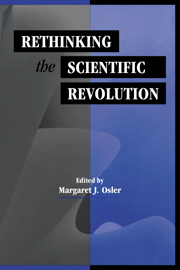Book contents
- Frontmatter
- Contents
- List of Contributors
- Preface
- Introduction
- Part I The Canon in Question
- Part II Canonical Disciplines Re-Formed
- Part III Canonical Figures Reconsidered
- 9 Pursuing Knowledge: Robert Boyle and Isaac Newton
- 10 The Alchemies of Robert Boyle and Isaac Newton: Alternate Approaches and Divergent Deployments
- 11 The Janus Faces of Science in the Seventeenth Century: Athanasius Kircher and Isaac Newton
- 12 The Nature of Newton's “Holy Alliance” between Science and Religion: From the Scientific Revolution to Newton (and Back Again)
- 13 The Fate of the Date: The Theology of Newton's Principia Revisited
- 14 Newton and Spinoza and the Bible Scholarship of the Day
- Part IV The Canon Constructed
- Index
13 - The Fate of the Date: The Theology of Newton's Principia Revisited
Published online by Cambridge University Press: 25 October 2009
- Frontmatter
- Contents
- List of Contributors
- Preface
- Introduction
- Part I The Canon in Question
- Part II Canonical Disciplines Re-Formed
- Part III Canonical Figures Reconsidered
- 9 Pursuing Knowledge: Robert Boyle and Isaac Newton
- 10 The Alchemies of Robert Boyle and Isaac Newton: Alternate Approaches and Divergent Deployments
- 11 The Janus Faces of Science in the Seventeenth Century: Athanasius Kircher and Isaac Newton
- 12 The Nature of Newton's “Holy Alliance” between Science and Religion: From the Scientific Revolution to Newton (and Back Again)
- 13 The Fate of the Date: The Theology of Newton's Principia Revisited
- 14 Newton and Spinoza and the Bible Scholarship of the Day
- Part IV The Canon Constructed
- Index
Summary
And I, spoke eternity, how shall I appear before mankind so that they will not hold me in terror? Thus spoke the lord: I will grant to mankind one moment to grasp you. And he created love.
Betty Jo Teeter Dobbs argues that Newton's De gravitatione was composed in the year 1684 or early 1684/5. Most scholars (myself included) have fixed its date of composition no later than 1673. Nevertheless, Dobbs's claim is persuasive if not decisive. I shall assume her dating in reassessing the theological outlook that underlies the structure of Newton's Principia. My concern is how Newton's religious and natural philosophical beliefs interrelate within the intellectual context of their making. If Dobbs is right, De gravitatione is part of a creative process (begun in the mid-1680s) that includes the composition of the Principia This is a significant point. Seen from this perspective, De gravitatione expresses the theological world view that animates the Principia itself. To elaborate this theme, I consider “Tempus et locus,” a manuscript which can be dated to the early 1690s. This important manuscript, I argued, is part of Newton's revisions for the first edition of the Principia (1687), begun directly after that treatise was published. In both De gravitatione and “Tempus et locus” he considers the infinity of spatial extension. In De gravitatione he articulates its geometrical structure in relation to the being and activity of God. Once these connections are evident, the preface to the first edition of the Principia (1687) – which outlines relations between mathematics and nature – throws significant light on the structure of Newton's masterwork.
- Type
- Chapter
- Information
- Rethinking the Scientific Revolution , pp. 271 - 296Publisher: Cambridge University PressPrint publication year: 2000
- 9
- Cited by



